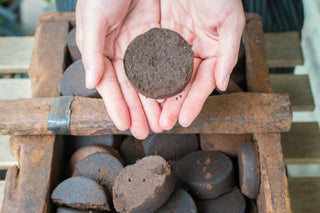Recycling food waste in order to generate the least amount of waste is a practice that many people adopt.
We have often dealt with this topic, with some advice on how to use leftover coffee for sweet and savory preparations, or how to recycle Italian Moka pot residues.
Today we want to delve deeper into this theme to discover if it really is a good practice using coffee grounds as fertilizer in our garden or in the pots we keep on the balcony, for which plants and in what way.1
Coffee grounds as fertilizer: what are the properties?
Coffee grounds are used for gardening and are considered a precious resource, despite the fact that few studies confirm their properties and support this type of application.
Before trying out this practice, it is important to bear in mind that coffee grounds, when added to compost, increase nitrogen levels, but they do not do as much – or rather, not as quickly – when located directly into soil.
However, they have numerous advantages: for example, they help with drainage, improve aeration and help the microorganisms that facilitate plant growth, as well as attract earthworms.
What plants love coffee grounds?
Coffee grounds work on the soil by lowering its pH value, or making it more acidic: this is true, though, only when we are dealing with fresh coffee grounds.
Before using coffee grounds as a fertilizer, it is important to know which plants thrive in soil when enriched by these wastes.
Acidophiles, for example, are perfectly at ease.
Among these, there are, for example: Azaleas, Lilies, Camellias, Gardenias and Hydrangeas.
Other species, on the other hand, do not like coffee-based fertilization: tomatoes, for example, although they prefer soils with an acid pH, do not respond well to this treatment.
Carrots and radishes, on the other hand, do, especially if the coffee grounds are added to the soil at sowing time.
Do coffee grounds improve plant growth?
Is it, therefore, a good idea to use coffee grounds as fertilizer? The answer is "not always".
Indeed, a study by the University of Melbourne has shown that the use of this fresh, i.e. non-composted, waste actually has a negative influence on the growth of vegetables, at least those used in the research (broccoli, radishes, leeks, sunflowers). The crops to which the study refers were sown in greenhouses, in different types of soil, and treated in four different ways:
● without any treatment or fertilizer;
● with fresh coffee grounds (5% of the total soil volume);
● with fertilizer;
● with fertilizer and coffee grounds.
Other plants were sown in open fields, without treatments, with fertilizers, and with four different quantities of coffee grounds.
Both the vegetables in the greenhouse and those out in the open fields showed very slow growth in the soils where coffee grounds had been added.
According to the researchers, the reasons may be linked to two factors: the nitrogen content and phytotoxicity.
We have already mentioned that fresh coffee grounds increase the nitrogen content in the soil, but this does not mean that plants can easily get it: in fact, absorption takes place only after the nitrogen has been transformed by the work of microorganisms.
The real availability, therefore, would not be so high.
Scholars attribute plant's growing difficulty to phytotoxicity: the presence of coffee in the soil causes the activation of stress mechanisms, but the dynamics of this process are still unclear.
Coffee grounds: better to use them after composting them
In conclusion, we can say that it is possible to use coffee grounds as a fertilizer with good results, but it is preferable to put them first in the compost and wait for them to be transformed by the microorganisms present inside.
Only at this point the gardening usage gives excellent results, without interfering with the growth of the plants.
Have you ever used coffee grounds as fertilizer in your garden?
Which results did you get?
 United States
United States


